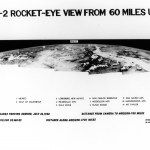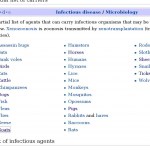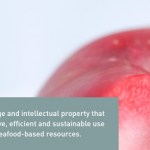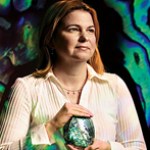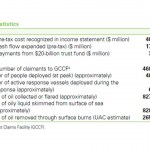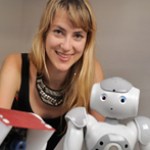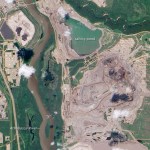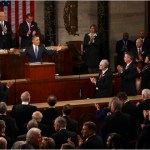Technology
"We came all this way to explore the moon, and the most important thing is that we discovered the Earth." -Bill Anders, Apollo 8 Astronaut
This Earth Day, I think -- for anyone interested in space, astronomy, or the Universe -- gives us perhaps the best opportunity to look back on our planet as we understand it now, having traveled so far away from it.
It was only, believe it or not, back in the 1940s that we first photographed our planet from high enough up to directly observe that, in fact, the Earth is curved!
The above image, from 1948 in space over New Mexico, was the first panorama…
A lot of things are broken because we fixed them. Somewhere out there is a web site that specializes in listing these things; Please let me know if you have a link, I can't find it at the moment. There is a web site that specializes in these things called "This is Broken" run by Set Godin (see video below). Anyway, it is annoying when some advancement causes something to not work. And it is especially annoying when the advancement is something that specifically should cause something to be improved in a certain direction and instead it gets unproved, er, messed up in that direction.…
Most people are at a loss to be able to identify any useful connections between arts and
sciences. This ignorance is appalling. Arts provide innovations through analogies, models, skills,
structures, techniques, methods, and knowledge. Arts don't just prettify science or make technology
more aesthetic; they often make both possible.
That cell phone or PDA you're carrying? It uses a form of encryption called frequency hopping to
ensure your messages can't easily be intercepted. Frequency hopping was invented by the composer
George Antheil in collaboration with the actress Hedy Lamarr. Yeah,…
Hey, it wasn't me that said that. It wasn't even another academic librarian.
It was Joshua Kim in his post from today's Inside Higher Ed, 5 Reasons Librarians Are the Future of Ed Tech.
It's a great post, talking from an outsider's perspective about what librarians bring to the educational process. Kim concentrates on the role that libraries and librarians can play in moving into campus educational technology roles but really, the list he gives applies to the roles that we can play all across the various functions on average campus. Especially those we play as librarians.
Not as…
I walked into the gleaming 'Orchard in a box", a closed greenhouse where no pollen can flow outside. The apple was red, red, red inside and out and I wanted it. But because I was in New Zealand, where experimenting with genetically engineered food is highly regulated, tasting was banned.
How was this forbidden fruit created? By overexpression of an apple transcription factor in the white-fleshed, tasty Royal Gala variety. The transcription factor was isolated from an apple that has both red flesh and red skin, that occurs in Central Asia. However, these apples are normally quite bitter…
by Elizabeth Grossman
"If I say pollution, the images that first come to mind are likely to be smokestacks, waste pipes, an accident or a disaster. But increasingly, environmental health researchers are focusing on sources that are much closer to home, like toys and beauty products and food packaging and cleaners and furniture. These are now sources of chemicals of interest," said Julia Brody, director of the Silent Spring Institute introducing a session on biomonitoring at this year's American Association for the Advancement of Science annual meeting held recently in Washington, DC. "The…
Usually my Around the Web posts are full of pink fluffy bunny ain't-the-Internet-grand kind of links. Oh, sure, I do link to the occasional train wreck but that's rare. I really prefer that strategy because I tend to be an optiministic (if slightly cautious) person by nature.
But everyone loves a good train wreck from time to time. And here they are.
What's the purpose of this? To balance the tendency towards Web utopianism with a pinch of human nature. I think that on the whole the web is vastly beneficial to the world but I'm also not delusional enough to think there's no downside.…
If researcher Angela Belcher has her way, electric cars of the future will be
equipped with lightweight, inexpensive batteries that can store enough electricity
to make driving such vehicles even more practical. Also on her laboratory "to
do" list: developing tougher electronic material so that you'll never lose your
computer again to an errant glass of water spilled on your keyboard.
Skillfully combining the disciplines of materials science, engineering and
bioengineering, Angela is focused on developing tougher and more effective
materials and devices for clean energy, electronics, the…
A couple of weeks ago, the ever-inimitably sarcastic master of pus himself, Mark Crislip, posted an excellent deconstruction of a very disappointing article that was published in the most recent issue of Skeptical Inquirer, the flagship publication of the Committee for Skeptical Inquiry (CSI). I say "disappointing," because I was disappointed to see SI (Skeptical Inquirer, not Sports Illustrated) publish such a biased, poorly thought out article, apparently for the sake of controversy.
I've been an SI subscriber myself for several years, and usually enjoy reading the magazine, although of…
Earlier this week, the EPA released a report that quantifies costs and benefits of the 1990 Clean Air Act Amendments - and, surprise, surprise, the benefits substantially outweigh the costs: $2 trillion vs. $65 billion in 2020.
Specifically, The Benefits and Costs of the Clean Air Act from 1990 to 2020 evaluates the costs and benefits of programs implemented pursuant to the 1990 Clean Air Act Amendments, comparing today's outcomes with what would've been expected had control programs remained only as stringent as they were before the 1990 changes took effect. The figures cover not only the…
BP's just released 2010 Annual Report to shareholders is proforma, with the exception of a detailed section titled "Gulf of Mexico Spill." (p.34; you can read the full report here.)
No bonuses for the top Executives this year, but rewards for "good business results." Something to think about the next time you fill up your tank!
Below are some selected highlights from the 2010 Annual Report:
BP's estimates of the impact of the Gulf of Mexico oil spill:
Compensation of top Executives: (p. 112) (my emphasis)
While the tragedy of lost lives and environmental damage remains foremost in…
Source: "Girls As Inventors," The Huffington Post on the MIT Media Lifelong Kindergarten Group.
While science and technology may be complex and daunting, one thing is quite clear: we need more women to drive innovation and to provide different insights and perspectives compared to men. Tomorrow, March 1st at 11 am EST, The Dow Chemical Company and Scientific American are hosting a Virtual Conference to Engage Scientific Thought Leaders on the Future of Women in Chemistry.
I invite you to listen, learn and add your voice.
According to the website:
60 speakers. 60 minutes.
60 insightful…
Heather Knight is an engineer on a mission.
Known as a social roboticist, she is constantly thinking about new ways to make robots charismatic, giving them the necessary personality and social skills to interact with humans in meaningful ways.
Her work includes developing a cuddly robot called "Data" (named after the Star Trek character) who does stand-up comedy before live audiences. Impossible, you say? Well, read on.
Currently a young graduate student at Carnegie Mellon University, Heather is already a pioneer in the growing field of social robotics which investigates ways in…
Meet Storm Chaser Josh Wurman and Discover first-hand from this original storm chaser what it's like to track and study deadly tornadoes across the Kansas landscape and stare down wicked hurricanes off the Gulf of Mexico!
You could say Josh Wurman was born to chase storms. Even as kid he was adventurous with a penchant for science, especially delving into the mysteries and wonders of bad weather.
But growing up in the relatively placid climates of Pennsylvania, he really didn't have any meaningful opportunities to experience really severe weather like tornadoes, hurricanes, or even real…
Changing our energy infrastructure from one that contributes to climate change to one that is renewable and sustainable poses enormous challenges technically, politically, socially, and economically. There isn't going to be a single solution, but a combination of technological changes, policy changes, efficiency gains, and adaptations to local environments will likely go a long way to making our current system better.
But there is a big difference between better and good. In Cradle to Cradle: Remaking the Way We Make Things, architect Bill McDonough and environmental chemist Michael…
Ray Kurzweil is a genius. One of the greatest hucksters of the age. That's the only way I can explain how his nonsense gets so much press and has such a following. Now he has the cover of Time magazine, and an article called 2045: The Year Man Becomes Immortal. It certainly couldn't be taken seriously anywhere else; once again, Kurzweil wiggles his fingers and mumbles a few catchphrases and upchucks a remarkable prediction, that in 35 years (a number dredged out of his compendium of biased estimates), Man (one, a few, many? How? He doesn't know) will finally achieve immortality (seems to me…
Occasionally, there are topics that my readers want -- nay, demand -- that I cover. The topic of this post, it turns out, is one of them. It's a link to a TED Talk. I'm guessing that most of our readers have either viewed (or at least heard of) TED talks. Typically, they are 20-minute talks, with few or no slides, by various experts and thought leaders. Many of them are quite good, although as the TED phenomenon has grown I've noticed that, not unexpectedly, the quality of TED Talks has become much more uneven than it once was. Be that as it may, beginning shortly after it was posted,…
Atul Gawande's latest New Yorker article, "The Hot Spotters," is a must-read for anyone concerned about the out-of-control growth of US healthcare costs (and that description should apply to everyone in this country). It's about possible solutions to the problem of the highest-cost patients, who account for a disproportionate share of healthcare spending but often aren't getting the kind of care that could really improve their lives. Gawande visits several organizations that are testing out ways to deliver better, more cost-effective care to patients with multiple chronic conditions and high…
Doug Mills/The New York Times
President Obama focused attention on preparing the United States to thrive against global competition.
President Obama's 2011 State of the Union speech was broad, thematic and optimistic as expected. Each listener comes to such a speech with their own perspective and background. As a scientist, I was particularly encouraged to hear a theme of the importance of education in science, technology, engineering and mathematics (STEM) to drive innovation, a call for more respect for teachers as "nation builders" and, perhaps most poignant - the President's…
I think DNA is amazing. I think biotech inspires great design. And if you've read this blog at all, you know I love sciart. But I just cannot understand the new infogenetics product from DNA 11 - the company behind that trendy gel electrophoresis wall art. While I'd normally just say "I don't get it" and move on, DNA 11 claims that their "augmented art" is "the ultimate intersection of biology, art and technology." I don't know how that could get more squarely in the BioE wheelhouse. So let's take a closer look at how, exactly, biology and art intersect in the "Ancestry Portrait" (pictured…
